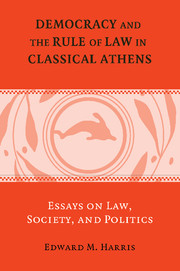1 - Pheidippides the Legislator: A Note on Aristophanes' Clouds
Published online by Cambridge University Press: 25 February 2010
Summary
in aristophanes' clouds strepsiades sends his son pheidippides to the Thinkery of Socrates to learn the Weaker Argument (1107–10). Before he enters the Thinkery, Stronger Argument tells the young man what he will acquire under the tutelage of Weaker Argument: a sallow complexion, a terrible physique, a large tongue, and a long decree (1015–19). After he returns from the Thinkery, he shows off his newly acquired legal knowledge by showing his father how to twist the law and evade his creditors (1178–200).
Pheidippides again demonstrates how much he has learned about law when he beats his father (1420–6). Strepsiades objects that it is a law (νομίζεται) that a father should not suffer such treatment. Pheidippides points out that there was someone who originally established this law (οὐκοῦν ἀνὴρ ὁ τὸν νόμον θεὶς τοῦτον ἧν τὸ πρῶτον) and persuaded the men of old to accept it. Cannot he too make a new law (ἔξεστι κἀμοι καινὸν … θεῖναι νόμον)? This law would order that henceforth (τὸ λοιπόν) sons should beat their fathers back, that is, for the blows they received as children (cf. 1408–15). He then adds an exemption clause: so many blows (ὅσας δὲ πληγὰς) as we children received before the law was established are granted a release (ἀφιέμεν).
Pheidippides' humorous proposal reveals his detailed knowledge of the language of Athenian laws and decrees. When the Athenians passed a measure in the Assembly, they often indicated that its provisions would take effect “hence-forth” (τὸ λοιπόν). This meant that the provisions would not apply before the date the measure was passed.
- Type
- Chapter
- Information
- Democracy and the Rule of Law in Classical AthensEssays on Law, Society, and Politics, pp. 425 - 430Publisher: Cambridge University PressPrint publication year: 2006

